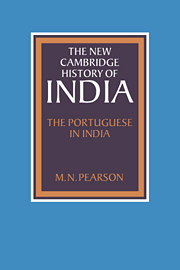6 - Decline and stagnation
Published online by Cambridge University Press: 28 March 2008
Summary
The decline of the Portuguese empire in India is a much more contentious subject than may at first be apparent. It was something of a favourite for sententious English writers both of the time and through almost to today. Standing in the ruins of Old Goa (which even by the late seventeenth century was being deserted by the elite; the viceroy moved to the present capital of Panjim in the mid eighteenth century and the town became the official capital in 1843), they waxed lyrical, often portentious, as they surveyed the huge churches surrounded by encroaching jungle. The ineffable Dr John Fryer in 1681 said tendentiously that the Portuguese ‘generally forgetting their pristine virtue, lust, riot and rapine … their courages being so much effeminated that it is a wonder to most how they keep anything, if it were not that they live among mean-spirited neighbours’ (quoted in H. G. Rawlinson, British Beginnings in Western India, Oxford, 1920, p. 16).
Such comments, which could be multiplied endlessly, provide classic illustrations of historical relativity. English writers in the later seventeenth century, like Dr Fryer, wrote in a context of increasing, and profitable, English trade in India, while Portugal's official and military position was in rapid decline. In Europe, this was the time of the Methuen treaty (1703), which in effect turned Portugal into a British commercial colony. By the late eighteenth century British writers represented a country entering upon a period of world supremacy based on the industrial revolution, and one which had already made much larger conquests in India than the Portuguese had ever achieved.
- Type
- Chapter
- Information
- The Portuguese in India , pp. 131 - 143Publisher: Cambridge University PressPrint publication year: 1988



